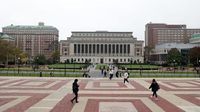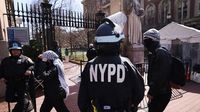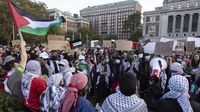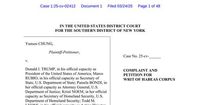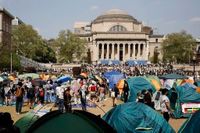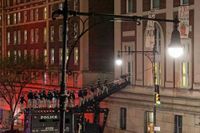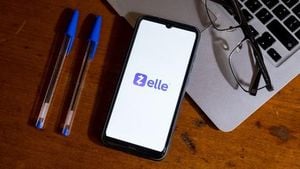NEW YORK CITY (WABC) -- In a heated battle over free speech and immigration, Yunseo Chung, a 21-year-old junior at Columbia University, has found herself at the center of a controversial lawsuit against President Donald Trump and senior administration officials. Alleging that her legal permanent residency was revoked in retaliation for her participation in pro-Palestinian demonstrations, Chung's case raises significant constitutional questions about free speech rights and the limits of immigration enforcement.
Chung, a South Korean native who moved to the United States at the age of seven, filed her lawsuit on March 24, 2025, after claiming that federal agents sought her detention following her involvement in a sit-in protest at Barnard College on March 5. Her lawsuit alleges that since her participation in the protest, which demanded fair treatment for Palestinian rights, federal agents searched her dormitory, visited her family home, and issued an administrative warrant to revoke her legal status.
“The prospect of imminent detention and deportation has chilled her speech,” the lawsuit states. “Ms. Chung is now concerned about speaking up about the ongoing ordeal of Palestinians in Gaza as well as what is happening on her own campus, where fellow students are being targeted.” The chilling effect discussed in the lawsuit highlights the substantial impact of fear on students wanting to express their opinions—an issue that resonates deeply in the current political climate.
The backdrop of Chung’s case is part of a larger trend: the Trump administration's aggressive stance against students who advocate for Palestinian rights. Just days after Chung's involvement in the protests, federal immigration agents arrested another Columbia student, Mahmoud Khalil, on charges linked to similar activities. According to reports, Khalil has been labeled as a “radical foreign pro-Hamas student” by administration officials, reflecting a broader narrative aimed at labeling dissenting voices on campus as dangerous to national interests.
The lawsuit argues that Chung’s detention under these circumstances represents an unprecedented assault on her First Amendment rights. It claims the administration has attempted to use immigration enforcement as a tool to suppress political dissent. Chung's legal representatives, from the Center for Law and Advocacy for Immigrants at CUNY, contend that “ICE's shocking actions against Ms. Chung are part of a larger pattern of attempted repression of constitutionally protected protest activity and other forms of speech, particularly those critical of U.S. foreign policy regarding Israel.”
The claims made in Chung's lawsuit underscore the longer-term implications of the government’s approach to immigration enforcement regarding noncitizens engaged in political speech. Amid rising tensions surrounding U.S. policies towards Israel and Palestine, activists and students across the country have mobilized, calling for greater accountability and transparency. The administration's targeting of these students raises serious concerns regarding not just personal consequences but broader repercussions for civil liberties.
According to legal experts, Chung’s case is not an isolated incident but rather a symptom of a systematic attempt to crack down on advocacy for Palestinian rights. “Using immigration as a weapon against free speech is a profoundly dangerous precedent,” noted attorney Naz Ahmad, representing Chung. Recent executive orders from the Trump administration underscore this point, emphasizing a commitment to revoking visas and green cards of foreign nationals viewed as threats due to their political activities.
As the case unfolds, its implications extend beyond Chung and Khalil. Other students involved in pro-Palestinian activism, including Ranjani Srinivasan, a Columbia graduate student who fled to Canada after facing serious repercussions linked to her advocacy, are also watching closely as the legal landscape around immigration enforcement continues to evolve.
The chilling effects of these legal actions are evident on campus. While many activists call for solidarity with Palestinians, the fear of repercussions from federal authorities has led some students to alter their level of activism or refrain from participating altogether. “This isn’t just about one student,” said activist and Columbia student Emma Lee. “This is about the right to protest and to express dissent without the fear of losing everything.”
As national attention focuses on Chung’s case, it is becoming clear that the nervous climate among student activists is emblematic of a broader societal struggle over the intersection of civil liberties and national security. Legal challenges against the administration’s actions will continue to mount as activists seek to protect their rights in the face of potential government overreach.
Chung’s lawsuit seeks to bar any government refusals based on protected speech, arguing for the need to affirm the rights of noncitizens to engage in activism without fear of deportation. In a politically charged environment, where free speech is becoming increasingly scrutinized, the outcome of Chung’s lawsuit could set a significant precedent for the future of advocacy on college campuses nationwide.
As this case moves through the legal system, its potential ramifications will likely resound far beyond Columbia University, shaping the conversation around immigration and expressive freedoms in modern America. This is a pivotal moment, not just for the lives of students like Chung and Khalil but for the very essence of free speech in the United States.
